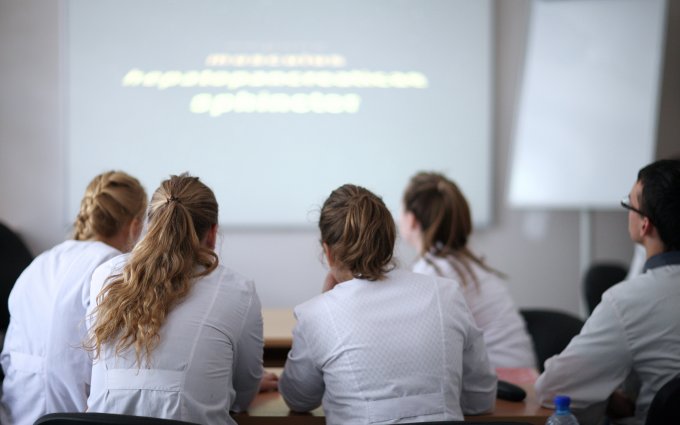10/11/2015

“The will to be well.”
Daniel Kish, blind since he was 13 months old, held a magazine in front of him, made a shhhhhhhhhhh sound, and taught the crowd of Innovation Symposium participants how to learn “FlashSonar” – in effect, “seeing” with their ears. And in seconds, they were doing it.
“Could you hear that?” he said. He had the crowd close their eyes and listen to the pitch change as he moved the magazine closer and farther away from his face. “You heard that with no training. That’s the imaging my brain does. It’s not hard to do.”
Kish, founder of the nonprofit World Access for the Blind, uses the technique of FlashSonar to “see” the world around him and teaches it to others, especially young children. It involves making sounds with the mouth that bounce off objects to help a blind person illuminate an environment. It’s not unlike what bats and dolphins do, what’s called echolocation.
He used this work with the blind as an example of how people can will themselves to wellness.
“They can enjoy greater capacity and opportunity, enabling them to contribute to their community and society.” Kish used some of his work with blind children to illustrate the point. He said parents and therapists of blind children make the mistake of thinking that fostering dependency ultimately leads to freedom. It doesn’t.
“Often these kids have the will and the purpose to be independent, but that will can be usurped by circumstances.” His own parents recognized this when he was a baby, supporting his “primal drive” to be free of his condition. “I was making my first FlashSonar sounds when I was 18 months old!”
That primal drive is one of three elements Kish believes is essential to finding wellness. This sense of purpose and conviction is what drives people to recover.
“Over 60% of the people we help are children,” Kish said. “They really do have this primal drive to establish their relationship with their surroundings, so they have the freedom and understanding to interact with their world.” He went on to say that this drive is most expressive in children, that blindness doesn’t diminish the drive.
The second element to finding wellness is network support – in short, family, friends and therapists. “They have to buy into this freedom, just like my parents did.”
Kish identified the concept of challenging convention as the third key ingredient to finding wellness. “Mark Twain once said that if you do what you’ve always done, you’ll get what you’ve always gotten. Real innovation isn’t about improving what you’re doing, it’s changing everything you know.” He added that we have to have the will to change. When we do that, we change our brain. “Our brain begins to change before we even are conscious that we have the will to do it.”
Kish also talked about “vision acuity.” Not sight in the traditional sense, but real vision – the things that can be seen without the eyes. To measure it, he asks himself two questions. “To what extent are my thoughts, feelings and actions a result of how I’ve been conditioned by society versus my own free will? And to what extent is the way I feel and act in the best interest of myself and others?”
Kish finished his presentation with an uplifting video of blind children, teens and adults who have willed themselves to wellness through these new techniques. He referred to it as, “our shameless, over-the-top, whiz-bang video.” But one young man interviewed on the video summed up the day’s presentation perfectly.
“The question isn’t about what blind people can’t see, but how much can blind people really see?”